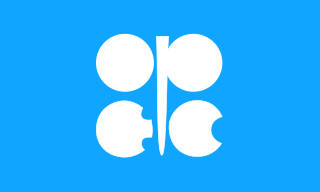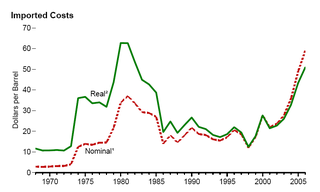Related Research Articles

The economy of Saudi Arabia is one of the top twenty economies in the world, and the largest economy in the Arab world as well as in the Middle East. Saudi Arabia is part of the G20 group of countries.

The Organization of the Petroleum Exporting Countries is an intergovernmental organization or cartel of 13 countries. Founded on 14 September 1960 in Baghdad by the first five members, it has since 1965 been headquartered in Vienna, Austria, although Austria is not an OPEC member state. As of September 2018, the 13 member countries accounted for an estimated 44 percent of global oil production and 81.5 percent of the world's "proven" oil reserves, giving OPEC a major influence on global oil prices that were previously determined by the so-called "Seven Sisters" grouping of multinational oil companies.
The 1973 oil crisis or first oil crisis began in October 1973 when the members of the Organization of Arab Petroleum Exporting Countries led by Saudi Arabia proclaimed an oil embargo. The embargo was targeted at nations that supported Israel during the Yom Kippur War. The initial nations targeted were Canada, Japan, the Netherlands, the United Kingdom and the United States with the embargo also later extended to Portugal, Rhodesia and South Africa. By the end of the embargo in March 1974, the price of oil had risen nearly 300%, from US$3 per barrel ($19/m3) to nearly $12 per barrel ($75/m3) globally; US prices were significantly higher. The embargo caused an oil crisis, or "shock", with many short- and long-term effects on global politics and the global economy. It was later called the "first oil shock", followed by the 1979 oil crisis, termed the "second oil shock".

Peak oil is the moment at which extraction of petroleum reaches a rate greater than that at any time in the past and starts to permanently decrease. It is related to the distinct concept of oil depletion; while global petroleum reserves are finite, the limiting factor is not whether the oil exists but whether it can be extracted economically at a given price. A secular decline in oil extraction could be caused both by depletion of accessible reserves and by reductions in demand that reduce the price relative to the cost of extraction, as might be induced to reduce carbon emissions.

Petroleum politics have been an increasingly important aspect of diplomacy since the rise of the petroleum industry in the Middle East in the early 20th century. As competition continues for a vital resource, the strategic calculations of major and minor countries alike place prominent emphasis on the pumping, refining, transport, sale and use of petroleum products.
Oil Storm is a 2005 television mockumentary portraying a future oil-shortage crisis in the United States, precipitated by a hurricane destroying key parts of the United States' oil infrastructure. The program was an attempt to depict what would happen if the highly oil-dependent country was suddenly faced with gasoline costing upwards of $7 to $8 per gallon. Directed by James Erskine and written by Erskine and Caroline Levy, it originally aired on FX Networks on 5 June 2005, at 8 p.m. ET.

The Energy Policy and Conservation Act of 1975 (EPCA) is a United States Act of Congress that responded to the 1973 oil crisis by creating a comprehensive approach to federal energy policy. The primary goals of EPCA are to increase energy production and supply, reduce energy demand, provide energy efficiency, and give the executive branch additional powers to respond to disruptions in energy supply. Most notably, EPCA established the Strategic Petroleum Reserve, the Energy Conservation Program for Consumer Products, and Corporate Average Fuel Economy regulations.

The price of oil, or the oil price, generally refers to the spot price of a barrel of benchmark crude oil—a reference price for buyers and sellers of crude oil such as West Texas Intermediate (WTI), Brent Crude, Dubai Crude, OPEC Reference Basket, Tapis crude, Bonny Light, Urals oil, Isthmus and Western Canadian Select (WCS). There is a differential in the price of a barrel of oil based on its grade—determined by factors such as its specific gravity or API gravity and its sulfur content—and its location—for example, its proximity to tidewater and refineries. Heavier, sour crude oils lacking in tidewater access—such as Western Canadian Select—are less expensive than lighter, sweeter oil—such as WTI.
For further details see the "Energy crisis" series by Facts on File.
An energy superpower is a country that supplies large amounts of energy resources to a significant number of other countries, and therefore has the potential to influence world markets to gain a political or economic advantage. Russia is the world's most widely described energy superpower. Other countries sometimes referred to such include Saudi Arabia, Canada, Venezuela, and Iran. The United States is said to be a potential energy superpower because of its large shale gas reserves.

US energy independence is the idea of eliminating the need for the United States to import petroleum and other foreign sources of energy, either entirely or with the exception of imports from Canada and Mexico, in which case it is called North American energy independence. Energy independence is espoused by those who want to leave the US unaffected by global energy supply disruptions, and to restrict reliance upon politically unstable states for its energy security. Energy independence is highly concerned with oil, the source of the country's principal transport fuels.

Peak oil is the point at which oil production, sometimes including unconventional oil sources, hits its maximum. Predicting the timing of peak oil involves estimation of future production from existing oil fields as well as future discoveries. The most influential production model is Hubbert peak theory, first proposed in the 1950s. The effect of peak oil on the world economy remains controversial.
Megacorpstate is a form of market structure that designs new strategies to systematize the cartel power in the world. This particular market framework consists of oligopolistic interdependent nations-states and multinational corporations, which have established alliance to own majority of the market power. The most prominent organizations within the structure are OPEC and the Seven Sisters that include Exxon, Mobil, Socal, Royal Dutch-Shell, BP, Texaco and Gulf. Regardless of its great influence, Megacorpstate does not have a major recognition in the world. The main reason for its unfamiliarity is its disinclination to characterize itself as a separate market structure.

The following outline is provided as an overview of and topical guide to Saudi Arabia:

The proven oil reserves in Saudi Arabia are the reportedly 2nd largest in the world, estimated to be 268 billion barrels, including 2.5 Gbbl in the Saudi–Kuwaiti neutral zone. In the oil industry, an oil barrel is defined as 42 US gallons, which is about 159 litres, or 35 imperial gallons. They are predominantly found in the Eastern Province. These reserves were apparently the largest in the world until Venezuela announced they had increased their proven reserves to 297 Gbbl in January 2011. The Saudi reserves are about one-fifth of the world's total conventional oil reserves. A large fraction of these reserves comes from a small number of very large oil fields, and past production amounts to 40% of the stated reserves.
Energy in Saudi Arabia involves petroleum and natural gas production, consumption, and exports, and electricity production. Saudi Arabia is the world's leading oil producer and exporter. Saudi Arabia's economy is petroleum-based; oil accounts for 90% of the country's exports and nearly 75% of government revenue. The oil industry produces about 45% of Saudi Arabia's gross domestic product, against 40% from the private sector. Saudi Arabia has per capita GDP of $20,700. The economy is still very dependent on oil despite diversification, in particular in the petrochemical sector.

The 1970s energy crisis occurred when the Western world, particularly the United States, Canada, Western Europe, Australia, and New Zealand, faced substantial petroleum shortages as well as elevated prices. The two worst crises of this period were the 1973 oil crisis and the 1979 energy crisis, when the Yom Kippur War and the Iranian Revolution triggered interruptions in Middle Eastern oil exports.

Cyber ShockWave, similar to the Cyber Storm Exercise, was a 4-hour wargame conducted in February 2010 by the Bipartisan Policy Center, an American think tank based in Washington, D.C. Former high-ranking Cabinet and National Security Officials role played a cabinet level response to a cyberwarfare scenario. Portions of the exercise were later broadcast on CNN.

The Modern history of Saudi Arabia begins with the unification of Saudi Arabia in a single kingdom in 1932.
The Ministry of Energy is one of the governmental bodies of Saudi Arabia and part of the cabinet. The ministry has the function of developing and implementing policies concerning petroleum and related products.
References
- ↑ John Mintz (2005-06-23). "Outcome Grim at Oil War Game". The Washington Post . Retrieved 2008-10-25.
- ↑ "Simulation Report and Summary of Findings" (PDF). Archived from the original (PDF) on 2008-07-05. Retrieved 2008-08-24.
